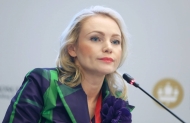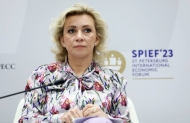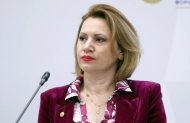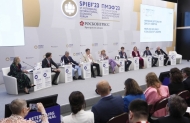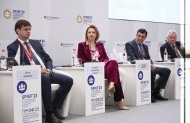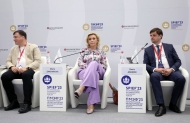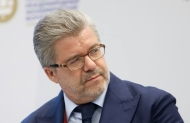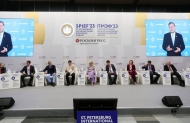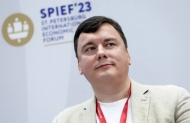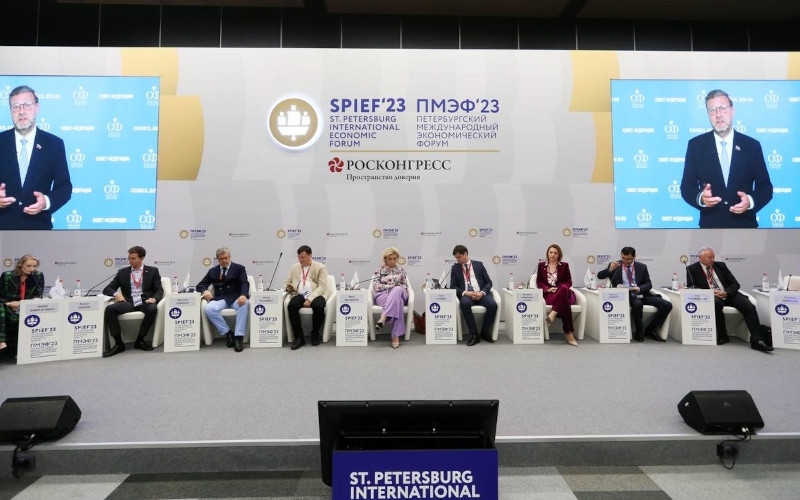
St. Petersburg, Russia, June 17, 2023. the Eurasian Peoples’ Assembly held the Panel Session of “People’s Diplomacy: Dialogue of Leaders” at the St. Petersburg International Economic Forum (SPIEF) 2023.
The meeting record is at the link: https://forumspb.com/programme/business-programme/104229/106741/#broadcast
The Panel Session of the Eurasian Peoples' Assembly "People's Diplomacy: Dialogue of Leaders" at SPIEF-2023 was moderated by:
- Natalia ZABOLOTSKIH, Deputy Head of the General Secretariat of the Eurasian Peoples' Assembly, coordinator of the International Competition "Leader of Public Diplomacy";
- Roman CHUKOV, Chairman of the Board of the Center for International Promotion, Assistant Director for Youth Policy of the Roscongress Foundation.
The First Deputy Secretary General - Head of the General Secretariat of the Eurasian Peoples' Assembly Svetlana SMIRNOVA noted in her greetings to the participants of the Panel Session:
“The Eurasian Peoples’ Assembly is only 6 years old. However, during this time we managed to build bridges of friendship with many peoples and countries not only of the vast Eurasian space, but also of other continents. Members of the Eurasian Peoples' Assembly are officially representatives of non-governmental organizations from more than 50 countries. The organization has many different areas of activity. And one of the main ones is to work with young people. It is very important today to form the right attitudes, to preserve spiritual, moral and family values - this is our main goal. We implement the project "New Generation of Eurasia", we hold various forums, seminars, and trainings for young people. Join our activities!
Deputy Chairman of the Federation Council Konstantin KOSACHEV, in a video greeting, noted the importance of public diplomacy, including among the youth.
“Why is public diplomacy so important today in the context of an acute crisis in international relations? First, the reason for the current crisis was the refusal of a number of countries from classical diplomacy as a means of solving problems. Instead, they started talking in the language of sanctions and so-called megaphone diplomacy. Secondly, the consequence of the crisis itself was a sharp reduction in diplomatic communication. And thirdly, today people's diplomacy is not like in the old days, visits, but your daily communication with peers in other countries. You can even play the same network games - and this will already be people's diplomacy,” the senator said.
Another important point that the speaker touched upon was the counteraction to the spread of fakes and the high importance of public diplomacy as a countermeasure tool.
“It is no secret that the truth is the first victim of conflicts. We live in an extremely politicized and tendentious information reality, in which there is a lot of propaganda, fakes, and distortions. That's probably true in a lot of countries right now. But that is why it is so important to get information firsthand, from people you are used to trusting. And that is why the formats and channels of public diplomacy are especially valuable. When there is peace around, they help to be friends. But when conflicts arise, they help not to antagonize," said Kosachev.
As an example, reflecting the activities of the Federation Council to support public diplomacy, he cited the Memory Train project, which was launched last year on the initiative of the speakers of the Upper Houses of the Parliaments of Russia and Belarus. It was attended by 100 schoolchildren from each of the two countries.
“Soon, on June 22 of this year, on the day of the beginning of the Great Patriotic War, a new Memory Train will start from Brest. Schoolchildren from Armenia and Kyrgyzstan will join the Russians and Belarusians. Together we are doing a great job. Therefore, I wish you interesting communication, new ideas and ambitious plans. Good luck!” the senator said.
Maria ZAKHAROVA, Director of the Information and Press Department of the Ministry of Foreign Affairs of the Russian Federation, devoted her speech to the topic of leadership:
“The leader is not the one who knows how to destroy, the leader is the one who knows how to create. The leader is not the one who knows how to pit and push, the leader is the one who knows how to harmonize.”
Maria Zakharova noted that the concept of "leadership" in the modern space is disavowed by individual political "leaders", their illogical actions, the ideology of confrontation, "the scarcity of their knowledge and ideas about the world."
The institute of leadership is undergoing an enormous stress test today, as if we were all being challenged: you, humankind, are ready to answer for those words, for those promises, for those deeds that you yourself have elevated to the status of achievements, you are ready to pass this stress test," says the Director of the Information and Press Department of the Russian Foreign Ministry. - It is impossible to absolutize the achievements of mankind and fix them forever and ever as not subject to any analysis, doubt, etc. Including because there are mass media that have already become mass media of absolute global scale and scope. And you can't hide anything. Today we monitor each person in real time. And now this correspondence of words and deeds is now subject to analysis by each of us.
Leadership today should not become an a priori benefit. Becoming a leader should not be a privilege, but a responsibility for everything he does and everything he says, and the need to check his words and his actions every second, Maria Zakharova emphasized.
"People's diplomacy is what today claims to be real, true leadership, because it is about the contribution of the individual, not about questioning your own place somewhere: leader - not leader, leading - not leading, but about what you were able to give, what you were able to sacrifice for others and what your efforts led to. It seems to me that this is what was originally invested in the understanding of the leader, - Maria Zakharova shared her opinion with the participants in the discussion. - People's diplomacy - this is the very example where, without claiming to be leaders, people do a number of actions, actions, steps in order to connect people around the world in order to overcome misunderstanding, in order to just solve those problems, which in many ways are created by "leaders" in different areas.
"So, who is the real leader - the one who calls himself so, who is appointed indirectly, blindly, or the one who, without possessing all these titles, daily (and public diplomacy is daily work) painstakingly, overcoming, goes forward not for himself, but for a very important, very necessary common task," Maria Zakharova concluded her speech.
Deputy Head of Rossotrudnichestvo Dmitry POLIKANOV spoke about educational and volunteer programs aimed at young people.
According to Dmitry Polikanov, one of the flagship projects of Rossotrudnichestvo is quotas for education in Russia.
"Every year our country allocates 30,000 places for the brightest, smartest, most talented applicants from abroad to get free education at different levels: bachelor's, master's, specialist, postgraduate, advanced training. Together with the Ministry of Education and Science we are developing a service for seamless support of a foreign student in Russia - from submitting documents and arriving in the country to studying in the university," he said.
Other strong projects of the Agency include "New Generation" and "Hello, Russia!".
“We improvе these programs. It's not just tourism, its educational programs, and we strengthen this component. We give the participants new knowledge so that when they come back home, they know that they have friends in Russia, that they have done something useful and that Russia has given them this experience. This is how a physical connection to the country is created," stressed Dmitry Polikanov.
For two years, as part of the “Mission Dobro” and “Time for Good Deeds” programs, Rossotrudnichestvo has been bringing Russian volunteers to countries where help is needed: training in important skills and professions, consultations, and manual work.
“It is important that our volunteers and local NGOs in these countries generate new humanitarian projects. By the end of this year or the beginning of next year, we plan to organize trips of foreign volunteers to Russia to work with our NGOs,” said the Deputy Head of Rossotrudnichestvo.
He also added that today NGOs are among the leaders of public diplomacy. Rossotrudnichestvo is ready to help such organizations and plans to launch a special course in partnership with the Gorchakov Foundation.
Twinning of regions is also a promising area of work. In today's context, it is this tool at the municipal level that helps to connect ordinary citizens. According to Dmitry Polikanov, Rossotrudnichestvo is currently developing guidelines for organizing twinning so that it makes a real contribution to the development of tourism, the economy and education in the regions. And the leading role in this process belongs to the youth.
No less important is the historical and memorial activity.
“It is not enough just to erect a monument and lay flowers. It is necessary that as many people as possible learn the truth through modern formats. And only young people can offer them too,” said Dmitry Polikanov.
At the end of his speech, he touched upon the topic of preserving spiritual and moral values, the topic Rossotrudnichestvo pays great attention to.
Director of the Information and Press Department of the Ministry of Foreign Affairs of the Russian Federation Maria Zakharova added:
“We should not become just the guardians of spiritual and moral values, we should not be dogmatists, but those who activate it in themselves and pass this fire on to others.”
Deputy Head of Rosmolodezh Denis ASHIROV spoke about the most important youth event next year - the World Youth Festival.
“Our country, Russia, is a country of opportunities. It is this main message that the festival has been conveying to the youth of the whole world since 2017,” said Denis Ashirov.
In 2024, the festival will be held from March 1 to 7 in Sochi. More than 70 countries have already confirmed their participation. The event will bring together over 20 thousand participants. An innovation will be the work of the children's sector.
Denis Ashirov presented a presentation video about the World Youth Festival to the participants of the session.
The speech of the head of the Center for the Study and Development of Continental Integration "Northern Eurasia" (Belarus) Alexei DZERMANT sounded like a declaration of all people of good will:
“We are people of good will who don't want to build iron curtains, who don't want to feel like a jungle compared to some kind of garden. Openness to the world is one of the key values. It is needed so that we do not see each other as opponents, do not turn into people who suspect something bad in their neighbor or partner. And therefore, mobility, including academic mobility, is extremely important for young people. The knowledge that comes through communication is a colossal foundation on which we can build our Eurasian integration, a Great Eurasian Partnership and another world where there is no division into higher and lower, where there is no hegemon, but there is a desire to develop, go together and cooperate. Meaning in knowledge, openness to knowledge, openness to development are the key things that young people are largely in demand, and here we need to fill many gaps.
If we are talking about values that are added to meanings, yes, traditions are good, conservatism is good. And indeed, it is necessary to keep the fire here, not the ashes. And this fire is exactly what helps us to go further and develop. We are one humanity, we are a symphony of different cultures. And in this symphony, it is extremely important for representatives of different cultures to remain themselves. But we all have the task of preserving ourselves on this planet, making it cleaner, better, not allowing us to be pitted against each other, not to allow nations to be pitted.”
The participants of the session were welcomed by the Secretary General of the China SCO Committee for Good-Neighbourliness, Friendship and Cooperation, Ms. Zheng WEI (China):
“The theme of today's panel session, organized by the Eurasian Peoples' Assembly, is extremely relevant. Today our world is changing like never before. However, the more instability there is in the world, the more confidently the Shanghai Cooperation Organization moves forward. The SCO actively advocates cooperation and interaction, guided by the Shanghai spirit, makes efforts to ensure peace and development, strives for mutual trust and win-win.
There are more than 3 billion people in the SCO countries, including more than 800 million young people. If the youth prospers, then the state prospers, as Xi Jinping says, congratulating China on Youth Day.
Youth friendly exchanges have always been a priority area of cooperation within the SCO. The youth of the SCO countries take responsibility and care for the well-being of peoples, adhere to openness and inclusiveness, and take part in the cause of friendship and cooperation.”
Ms. Zheng Wei recalled that just the other day, the SCO People's Diplomacy Forum was held in Qingdao (China) and, as part of preparations for the forum, the Eurasian Peoples' Assembly and the China SCO Committee for Good-Neighbourliness, Friendship and Cooperation signed a memorandum on creating a basis for cooperation and interaction to strengthen mutual trust and good neighborliness. The memorandum attaches great importance to working with young people, Ms. Zheng Wei stressed.
“Supporting all forms of communication between young people and expanding the circle of friends, we will build a reliable platform for the development of young people of the SCO. Only joining efforts and tireless work in the name of great love will allow us to fulfill the tasks set for the sake of creating a wonderful large family of the SCO. I wish the Eurasian Peoples' Assembly further success, all the participants of the session - health, happiness," the Secretary General of the China SCO Committee for Good-Neighbourliness, Friendship and Cooperation concluded her speech with these words.
The topic of the activities of the institutions of public diplomacy of the SCO countries was continued by the Director of the SCO Center for Public Diplomacy in Uzbekistan Kabuljon SOBIROV (Uzbekistan):
“The other day the SCO turned 22 years old. This authoritative and unique organization today unites (together with potential partners) 26 states, which is more than half of the world's population. The region of the SCO countries has always served as a crossroads of civilizations, representatives of various faiths live here, and people's diplomacy has always developed here. However, as an institutionalized structure it has started to emerge in the last few years.
The SCO genetic code contains principles such as respect for the diversity of cultures, history, good memory, language, cultural characteristics, traditions, and so on.
Today, when we talk about quality education, we sometimes forget about quality bringing up. This is very important, because if we absorb the values of respect for different nationalities, languages, cultures from childhood, then we will grow up a person who will trust. Respect and trust are important elements in multilateral relations. Conversely, disrespect and distrust lead to negative consequences.
In the past five years, we have seen how the ranks of public diplomacy institutions are expanding within the framework of the SCO. But so far there is no permanent body within the SCO that would coordinate the activities of these institutions. Unfortunately, people's diplomacy within the framework of the SCO is not yet systemic. Therefore, in Qingdao we discussed the issue of creating a permanent body within the SCO, which would deal specifically with issues of people's diplomacy. There are already all the necessary conditions and prerequisites for this.”
The President of the Indian Youth Leaders Confederation also sent a video greeting to the participants of the Panel Session of the Eurasian Peoples’ Assembly “People’s Diplomacy: Dialogue of Leaders”; Deputy Chairman of the BRICS Chamber of Commerce and Industry (India) Sameep SHASTRY.
President of the Tunisian-Russian Chamber of Commerce and Industry, Winner of the I International Competition "Leader of Public Diplomacy" (Tunisia) Christina ROMANENKO (Louati) noted the invaluable contribution of the Assembly of the Peoples of Russia and the Eurasian Peoples’ Assembly as the organizers of the competition to the development of public diplomacy.
“An amazing thing happened at the competition – a symbiosis of like-minded people,” said Christina Romanenko (Luati). “Thanks to this symbiosis, new large-scale projects were born, previously unthinkable contacts were established.”
In conclusion, at the Panel session of the Eurasian Peoples’ Assembly “Public Diplomacy: Dialogue of Leaders”, the start of the II International Competition “Leader of Public Diplomacy” was solemnly announced.
Kind parting words addressed to people's diplomats were delivered by Stanislav KOROLEV, Deputy Secretary General of the Eurasian Peoples' Assembly, Director of the SCO National Center for People's Diplomacy; Yuri PALAMARCHUK, Deputy Secretary General of the Eurasian Peoples' Assembly, President of the Council for Interethnic Cooperation of the Leningrad Region, member of the Council under the Governor of the Leningrad Region for Interethnic Relations (Russia); Svetlana SMIRNOVA, First Deputy Secretary General of the Eurasian Peoples' Assembly, Chairman of the Council of the Russian Peoples' Assembly; Maria ZAKHAROVA, Director of the Information and Press Department of the Ministry of Foreign Affairs of the Russian Federation; Denis ASHIROV, Deputy Head of Rosmolodezh; Dmitry POLIKANOV, Deputy Head of Rossotrudnichestvo; Kabuljon SOBIROV, Director of the SCO Public Diplomacy Center in Uzbekistan (Uzbekistan).



